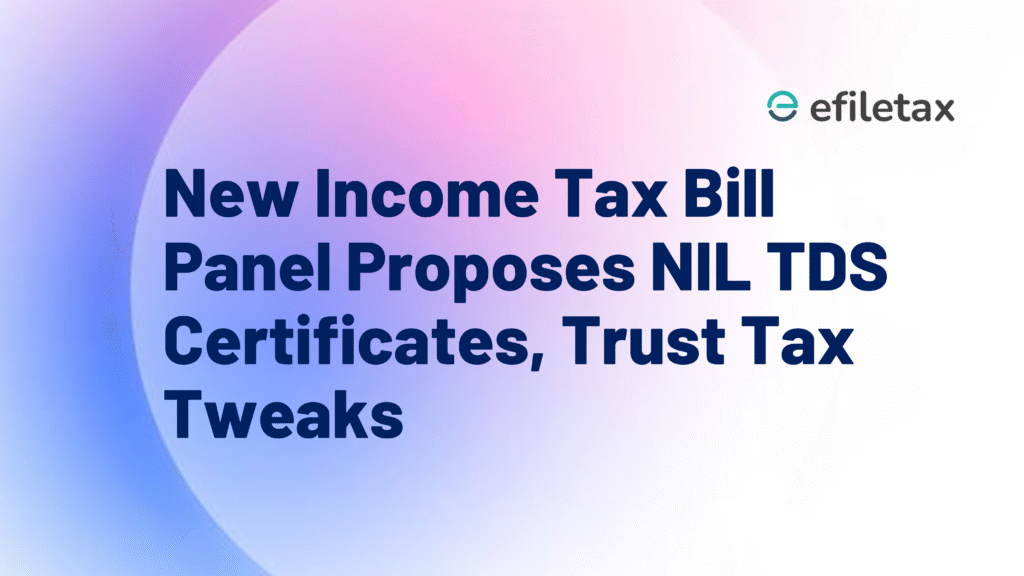
TDS Refunds and Trust Taxation: What’s Changing Under the New Income Tax Bill?
The new Income Tax Bill proposed by the Parliamentary Standing Committee brings major changes in TDS refund claims and taxation of trusts. These changes aim to reduce litigation, modernise compliance, and streamline India’s income tax law structure—currently based on the 1961 Act.
Why Is a New Income Tax Bill Being Proposed?
- The government aims to create a simpler, tech-friendly, and litigation-light regime.
The Parliamentary Standing Committee on Finance, chaired by MP Jayant Sinha, reviewed the draft bill submitted by the CBDT. It recommends clearer provisions on TDS refunds and income from charitable and religious trusts.
Key Proposal 1: Streamlining TDS Refund Claims
Current Challenges with TDS Refunds:
- Delayed processing of TDS mismatches.
- High number of refund-related disputes and CPC notices.
- Complex credit matching in Form 26AS vs ITR vs TDS returns.
What the Committee Recommends:
- Refund mechanism to be clarified in law, not left to circulars.
- Introduction of a time-bound framework for processing TDS refunds.
- Clear rules for credit of tax deducted in wrong PANs or AYs.
Expert View:
The proposal to legalise refund timelines will bring transparency and accountability to CPC refund processing,” says a Chennai-based tax practitioner.
Impact:
- More predictable timelines for refund credit.
- Fewer defective return notices.
- Better scope for appeal or rectification.
Key Proposal 2: Redefining Taxation of Trusts
Current Position:
- Exemptions allowed if 85% of income is applied to approved objects.
- Misuse has been flagged by multiple CAG reports and court cases.
Issues Identified:
- Trusts operating multiple entities with layered donations.
- Round-tripping of donations.
- Lack of uniform reporting norms.
What the Committee Recommends:
- Mandatory registration under a new streamlined framework.
- Enhanced powers for IT Department to verify genuineness of activities.
- Restrictions on inter-trust donations to avoid misuse.
Legal Reference:
CBDT has already introduced renewal-based registration (Form 10A/10AB) from April 2021 under the Finance Act, 2020. The Bill aims to codify and tighten these reforms into the new law.
Summary Table – Proposed Changes vs Current Rules
| Area | Current Provision | Proposed Change by Committee |
|---|---|---|
| TDS Refunds | Delays, credit mismatches, no legal timeline | Legalise refund timelines, allow correction |
| Trust Exemptions | Based on income application (85%) | Linked to activity verification and limits |
| Inter-Trust Donations | Often used to route funds | Likely to be restricted |
| Trust Registration | Once in a lifetime or renewed (from 2021) | Mandatory re-registration and compliance |
What Taxpayers and Professionals Should Do
- Watch for the draft law once published for public comments.
- Trusts must prepare for stricter scrutiny of books and activities.
- Professionals should update clients proactively, especially NPOs.
Frequently Asked Questions (FAQ)
Q1: Is this new Income Tax Bill in force yet?
No, it’s still under review. The CBDT submitted a draft.
Q2: Will old TDS refunds be processed faster now?
Only once the new law or rules are notified. But CPC processes may align to this direction gradually.
Q3: Are all charitable trusts affected?
Yes. Even existing registered trusts may need to re-register and comply with tighter norms.
Final Thoughts
The new Income Tax Bill is not just a rehash of the 1961 Act—it signals a compliance shift. With changes proposed in TDS refund claims and taxation of trusts, both individuals and institutions must prepare for cleaner, tighter rules.
Efiletax will keep you updated on the Bill’s progress and help you navigate the transition with expert-led compliance services.
Need help filing your TDS return or trust registration?
Summary
The new Income Tax Bill proposes legal timelines for TDS refunds and tighter rules for charitable trusts. With changes likely in exemptions, inter-trust donations, and registration, both taxpayers and professionals must prepare early. Learn how these reforms could impact you and how to stay compliant.